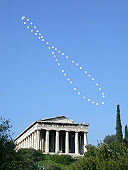
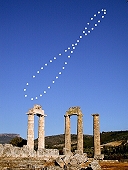 Viewing and
Understanding the Analemma
Viewing and
Understanding the Analemma
Photographs
by Anthony Ayiomamitis
What is
an analemma?
If you looked
at the Sun at the same time each day, from the same place, would
it appear at the same location in the sky? If the Earth were not
tilted, and if its orbit around the Sun were perfectly circular,
then, yes, it would. However, a combination of the Earth's 23.5
degree tilt and its slightly elliptical orbit combine to generate
this figure "8" pattern of where the Sun would appear at the same
time throughout the year. The pattern is called an analemma.
The Sun will
appear at its highest point in the sky, and highest point in the
analemma, during summer. In the winter, the Sun is at its lowest
point. The in-between times generate the rest of the analemma
pattern. (See
Analemma Curve.) Analemmas viewed from different Earth latitudes
have slightly different shapes, as do analemmas created at different
times of the day. Analemmas on the other planets have different
shapes entirely!
Learn more about analemmas and the associated Equation of Time.
Click
on each image for more details
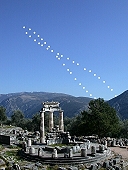
08:00:00 UT+2
Jan 12/02 - Dec 21/02
Tholos,
Ancient Delphi, Greece
Larger image (78K) |
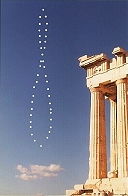
12:28:16 UT+2
Jan 12/02 - Dec 21/02
Parthenon,
Athens, Greece
Larger image (43K) |

16:00:00 UT+2
Jan 07/03 - Dec 20/03
Temple of Zeus,
Ancient Nemea, Greece
Larger image (163K) |

10:00:00 UT+2
Jan 07/03 - Dec 20/03
Hephaisteion,
Athens, Greece
Larger image (194K) |
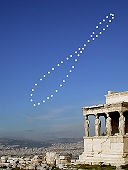
15:00:00 UT+2
Jan 07/03 - Dec 20/03
Erechtheion,
Athens, Greece
Larger image (158K) |
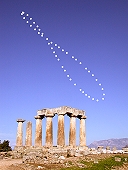
09:00:00 UT+2
Jan 07/03 - Dec 20/03
Temple of Apollo,
Ancient Corinth, Greece
Larger image (160K) |
Why are Analemmas
Hard to Photograph?
The analemma
is considered one of the most difficult and demanding astronomical
phenomenon to image. because it is never present all at once. It
requires a a virtual image made at the same time of day on 30 to
50 days throughout the year.
The analemmas
on this page were completed by Anthony Ayiomamitis of Greece
(http://perseus.gr), in a marathon
started in 2001 to document the complete range of analemmas from
sunrise to sunset. These photographs are unique in representing
the first analemmas ever imaged during a single calendar year
and the first analemmas ever imaged in Greece.
The photographer
first attached a filter to his camera to block out the extreme
light coming from the Sun. This filter also blocks any light coming
from the Greek ruins nearby, so only the Sun shows on his film.
Then he went to exactly the same spot, at exactly the same time
of day, throughout the year, and exposed the same film to the
Sun each time (multiple exposures). He made one final trip to
take a picture of the Greek ruins, this time without the filter
and without the Sun in the sky.
More information
about
Conquering the Solar Analemma Challenge.
Where Can
I Find Out More About Analemmas?
Analemma
photographs copyright © 2001-2004, Anthony Ayiomamitis ( http://perseus.gr)
All rights reserved.

